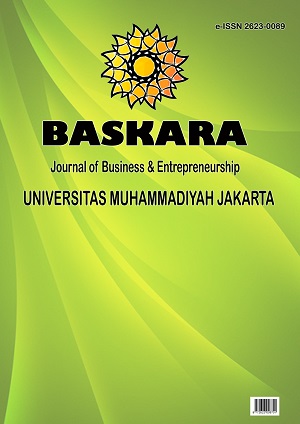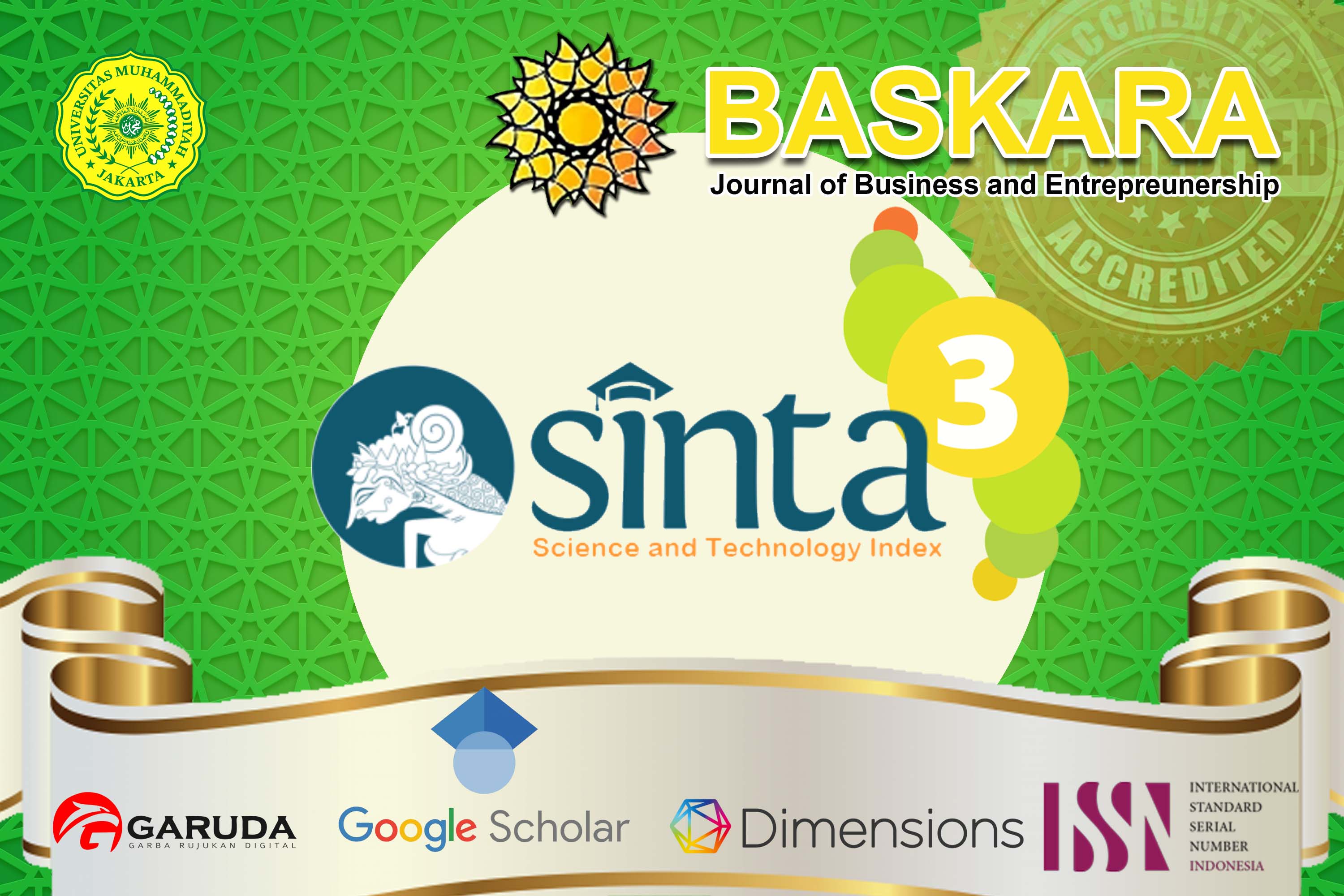The Effect of Life Style and Islamic Branding on Consumer Decisions in Buying Muslim Gamis Fashion Products in Bandar Lampung
DOI:
https://doi.org/10.54268/baskara.v4i1.9031Kata Kunci:
Life Style, Islamic Branding, Purchase DecisionAbstrak
Fashion is considered not only as clothing industry but also shows a person's lifestyle in appearance and becomes part of the identity of a group of people. "Gamis" is the trend among Indonesian women especially in Bandar Lampung, in recent years, is an encouraging phenomenon. The fashion industry is supported by various technological advances and the development of sophisticated civilization then it produces several products for its users. This is supported by several sides, both in terms of local designers who are increasingly capable of improving economic levels to the retail sector which is growing significantly. Indonesia has the potential to develop and even become a center for Muslim fashion in the world. This study aims to examine whether Life Style and Islamic Branding can influence purchasing decisions in Muslim fashion. The type of research is field research, and the nature of the research is quantitative descriptive analysis. The sample is consumers who use Muslim clothing products using the Solvin formula totalling 100 people. The data is analyzed using the SPSS version 21 application. The results, variable X1 or Life Style have a significant number below 0.05, which is equal to 0.000, so the hypothesis is accepted. The conclusion is the independent variable, namely Life Style, has a positive effect on the dependent variable, namely Purchase Decision (Y). This is in line with previous research and also the study of the theory of lifestyle on consumer decisions. The results of the research Variable X2 or Islamic Branding has a significant number below 0.05, which is equal to 0.003, so the hypothesis is accepted with the conclusion that the independent variable, namely Islamic branding (X2) has a positive effect on the dependent variable, namely, Purchase Decision (Y). The result is in line with previous research and also with the study of Islamic Branding theory.Referensi
Anggraini, N. (2008). Industri Kreatif. Jurnal Ekonomi, XIII(3), 144–151.
Dharmmesta, B. S., & Handoko, T. (2014). Manajemen Pemasaran Analisis Perilaku Konsumen, (1st ed.). BPPE.
Faizah, H., & Masreviatuti. (2018). Pengaruh Gaya Hidup dan Islamic Branding Terhadap Keputusan Pembelian produk Wardah. Jurnal Aplikasi Bisnis, 4(2).
Hurriyati, R. (2010). Bauran Pemasaran dan Loyalitas Konsumen. Alfabetha.
Moleong, L. J. (2017). Metode Penelitian. PT Remaja Rosdakarya.
Kartono, K. (2006). Pengantar Metodologi Riset Social. Alumni.
Kotler & Keller. (2009). Manajemen Pemasaran, Jilid 1, Edisi ke-13. Jakarta: Erlangga.
Liza, N., & S. Minarti, N. (2016). The Role of Religiosity, Attitude as Determinan Purchase Intention. Proceedings The International Multidisciplinary Conference.
Nasrullah, M. (2015). Islamic Branding, Religiusitas dan Keputusan Konsumen Terhadap Produk. Jurnal Hukum Islam, 13(2).
Nickels, W. G. (2010). Pengantar Bisnis. Salemba Empat.
Rangkuti, F. (2002). Measuring Customer Satisfaction. PT. Gramedia Pustaka Utama.
Rania, L. (2018). Pengaruh Trend Busana Muslimah Terhadap Gaya Busana Kuliah Muslimah Mahasiswa Jurusan Manajemen Fakultas Ekonomi Universitas Negeri Yogyakarta. S1 Thesis. Fakultas Teknik Universitas Negeri Yogyakarta.
Salaam Gateway. (2021). Global Islamic Economy Report 2020. Salaam Gateway.
Sanusi, A. (2014). Business Research Methodology. Salemba Empat.
Sholeh Soeaidy, M., & Siliwangi, A. (2018). Stimulasi Pada Generasi Milenial untuk Mau Membayar Harga Premium Fashion Melalui Status Merek dan Preferensi Merek. Jurnal Ekonomi Manajemen, 4(1), 30.
Siregar, S. (2012). Statistik Deskriptif untuk Penelitian. Rajawali Pers.
Sugiono. (2016). Metode Penelitian Pendidikan Pendekatan Kuantitatif, Kualitatif dan R&D. Alfabetta.
Trishananto, Y. (2019). Islamic Branding, Religiosity and Consumer Decision on Product. Journal of Islamic Economic Resarch, 1(2), 93.
Widiyawati, A. (2016). Pengaruh Masyarakat Islam dalam Pertumbuhan Ekonomi (Analisis Industri Fesyen Muslim). Community Development, 1(2), 1–20.
##submission.downloads##
Diterbitkan
Terbitan
Bagian
Lisensi
In order for Baskara: Journal of Business and Entrepreneurship to publish and disseminate research articles, we need publishing rights (transfered from author(s) to publisher). This is determined by a publishing agreement between the Author(s) and Baskara Journal. This agreement deals with the transfer or license of the copyright of publishing to Baskara: Journal of Business and Entrepreneurship, while Authors still retain significant rights to use and share their own published articles. Baskara : Journal of Business and Entrepreneurship supports the need for authors to share, disseminate and maximize the impact of their research and these rights, in any databases.
As a journal Author, you have rights for a large range of uses of your article, including use by your employing institute or company. These Author rights can be exercised without the need to obtain specific permission. Authors publishing in Baskara : Journal of Business and Entrepreneurship have wide rights to use their works for teaching and scholarly purposes without needing to seek permission, including:
- use for classroom teaching by Author or Author's institution and presentation at a meeting or conference and distributing copies to attendees;
- use for internal training by author's company;
- distribution to colleagues for their reseearch use;
- use in a subsequent compilation of the author's works;
- inclusion in a thesis or dissertation;
- reuse of portions or extracts from the article in other works (with full acknowledgement of final article);
- preparation of derivative works (other than commercial purposes) (with full acknowledgement of final article);
- voluntary posting on open web sites operated by author or author’s institution for scholarly purposes.
Copyright Transfer Agreement for Publishing (Publishing Right)
The Authors who submit manuscript has to understand that if accepted for publication, mean that all copyright and publishing right of the article shall be assigned/transferred to Baskara: Journal of Business and Entrepreneurship as assigned publisher.
- CC BY-NC: This license allows reusers to distribute, remix, adapt, and build upon the material in any medium or format for noncommercial purposes only, and only so long as attribution is given to the creator.
It includes the following elements:
BY ![]() – Credit must be given to the creator
– Credit must be given to the creator
NC ![]() – Only noncommercial uses of the work are permitted
– Only noncommercial uses of the work are permitted
Baskara (C) Copyright (2022):
BASKARA: Journal of Business and Entrepreneurship by https://jurnal.umj.ac.id/index.php/baskara
is licensed under a Creative Commons Attribution-NonCommercial 4.0 International License








